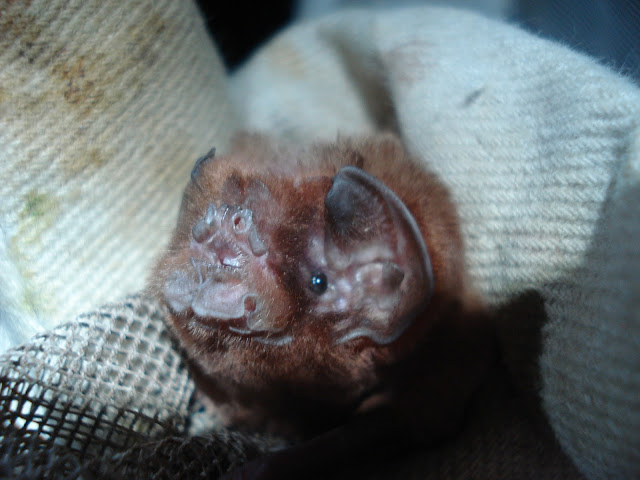(*Note I am in the process of changing the larvae video-> please check back!)
This blog is about what its like to be a bat researcher with a little bit about the things I love sprinkled throughout: bats (of course/understood), biology, music as well as the less expected.
Showing posts with label insects. Show all posts
Showing posts with label insects. Show all posts
Sunday, March 29, 2015
Drosophila boogie
It is high time to update a bit on the lab work I've been doing with fruit flies. First and formost fly work is fairly time demanding because they are constantly growing, reproducing and thus need a lot of care. To start things out let me introduce their larvae in the form a a video. Here they are on agar/fruit juice plates eatting and as you might suppose - growing!
I've decided they are rather cute and thus I'll include the David Bowie music video that I think fits their movements well!
Tuesday, December 3, 2013
Shocking sex secrets of insects!
I have a fun Opinion piece to direct you to titled 'Shocking Sex Secrets of Insects'- written by Marlene Zuk and published recently in the New York Times.
The image below illustrates the recent finding reported by Li et al, 2013 in a paper titled "Forever Love: The Hitherto Earliest Record of Copulating Insects from the Middle Jurassic of China".
The Opinion article by Dr. Zuk starts as follows:
Keep reading her article by clicking here.
Dr. Zuk is author of "Sex on Six Legs: Lessons on Life, Love and Language From the Insect World" and is a very engaging writer. Her book Sexual Selections is my favorite and is responsible in part for me pursuing certain lines of inquiry during my PhD work. I highly recommend it but have heard good things about the book shown below.
The image below illustrates the recent finding reported by Li et al, 2013 in a paper titled "Forever Love: The Hitherto Earliest Record of Copulating Insects from the Middle Jurassic of China".
 |
| Image: Shu LiChungkun ShihChen WangHong PangDong Ren |
The Opinion article by Dr. Zuk starts as follows:
"PROSTITUTION is supposedly the oldest profession, which means that sex
itself must be one of the oldest behaviors, a conclusion underscored by
the recent discovery of two bugs fossilized as they coupled 165 million
years ago. Simply being ancient doesn’t make a sex act interesting, but
this one was noteworthy in part because behavior is generally so
ephemeral, leaving none of the preserved remains we rely upon to tell us
about how early forms of life ate, or ran, or saw the world."
Keep reading her article by clicking here.
Dr. Zuk is author of "Sex on Six Legs: Lessons on Life, Love and Language From the Insect World" and is a very engaging writer. Her book Sexual Selections is my favorite and is responsible in part for me pursuing certain lines of inquiry during my PhD work. I highly recommend it but have heard good things about the book shown below.
Tuesday, June 11, 2013
Trinidad and Tobago bats
I am back home from a recent trip to Trinidad where the bats were abundant and from what I could see roosting in almost any and every abandoned house/garage/store on the island. That may be a bit of an exaggeration but there are certainly many amazing bats in Trinidad. Trinidad itself is beautiful, while the people are fun, kind and diverse. The island country just off the coast of Venezuela is home to amazing animals, plants as well as food! Just a word or two about the bats follow but I would suggest you read more about this interesting country if you find time.
Together with researchers from several different institutions we captured many species of bats but here are some of the more photogenic:
The greater spear-nosed bat (Phylostomus hastatus)
This very large bat makes very interesting vocalizations, roosts in groups and is known by bat biologists to have a forceful bite. That said these are fairly sweet bats and amazingly beautiful. Phylostomus eats fruits.
The ghost-faced bat (Mormoops megalophylla)
This is the 'oh my gosh what happened to it's face!' bat. Mormoops is an insect eater and comes in beautiful shades of orange- in case you can peel your eyes away from its strange face long enough to appreciate its fur color. Why the weird face? well that's a story for another time but may have something to do with it's use of echolocation to find insect prey.
The short-tailed fruit bat (Carollia perspicillata)
This tough looking little nose-leafed bat is the main bat studied on the island and lives in a variety of habitats. These little fruit-eating bats are quite small but are also famously good mothers and will take great care of a baby despite possible risks to the mother.
The Disk-winged bat (Thyroptera tricolor)
Another insect-eater, these tiny little bats roost head-up (which is unusual for bats who usually hang upside down) inside of leaves as they unroll. Read more about how other sucker footed bats don't suck here.
I hope to post more about T&T in the future but meanwhile I refer you to Trinibats.com which has amazing photos and information about a suite of other bats.
Subscribe to:
Posts (Atom)




